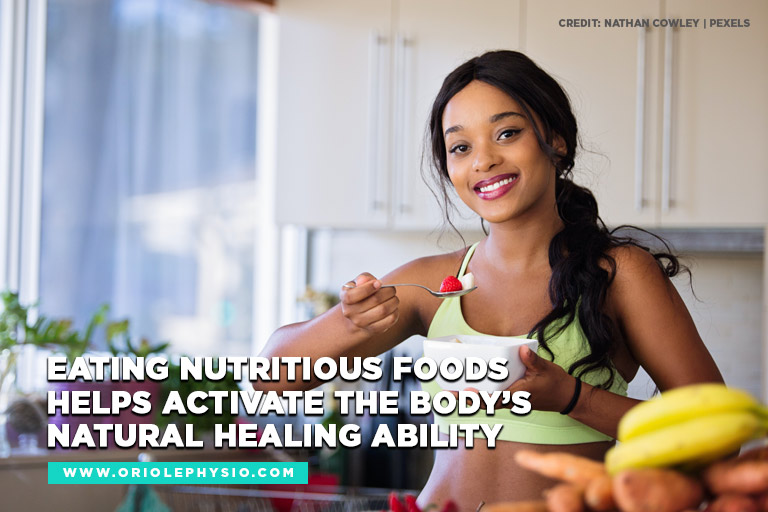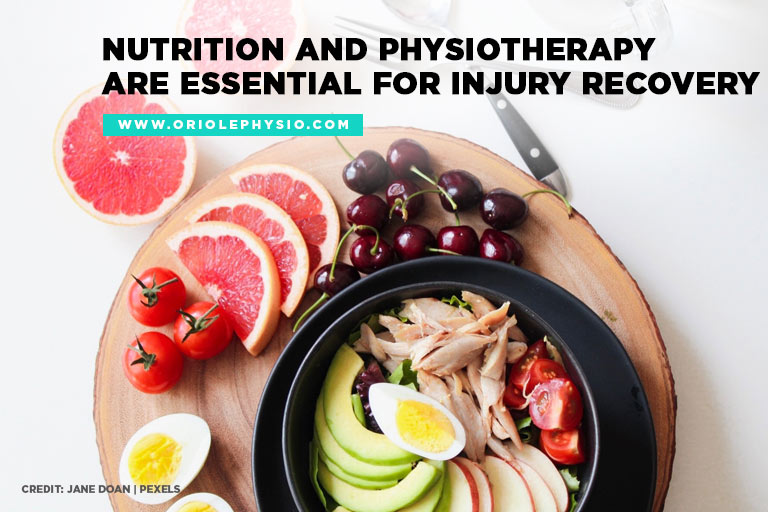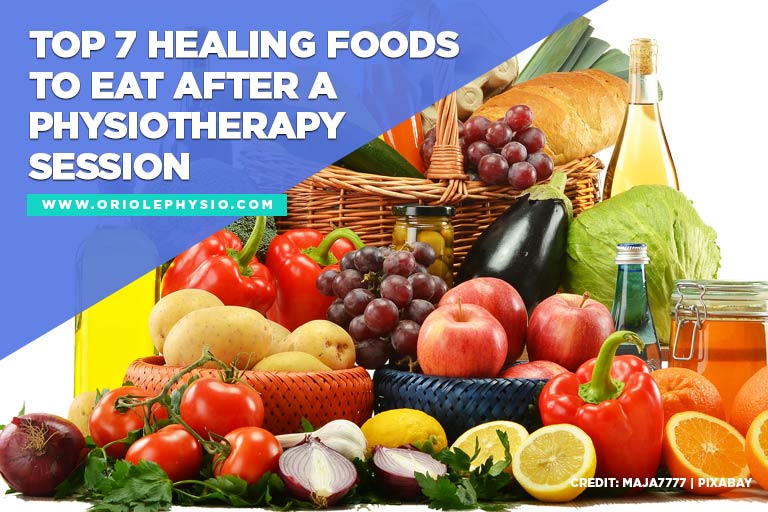Top 7 Healing Foods to Eat After a Physiotherapy Session
While many people think of physical therapy and rehabilitation routines when they imagine injury recovery, diet can also be just as important. The types of food you eat while healing can speed up your recovery time, make you feel better, and fuel your body for healing. Good nutrition is helpful in overcoming injuries, helping you to recover quickly.
Importance of Nutrition in Injury Recovery

Nutrition is essential to a healthy body and mind. Good eating habits are essential for performance and recovery from physical activity, but when we get injured, it is easy to forget all the normal diet habits while focusing on recovering.
The role of nutrition in physiotherapy cannot be undermined when it comes to recovering from an injury. The best foods for injury recovery will assist with rebuilding muscle, bone and tissue repair, and can even help reduce inflammation.
Top 7 Foods That Heal

Physiotherapy is an effective healing tool for injuries. However, apart from physical therapy and exercise, a healthy diet will also help your body heal faster. A good diet includes lots of fresh fruits and vegetables, along with plenty of lean proteins like salmon, chicken, turkey, and lean cuts of beef. This type of healthy diet is important because it will give your body the right nutrients it needs to quickly repair any damage caused by an injury.
Good eating habits and physical therapy training are the best ways to get you back on your feet as soon as possible. Here are some tips on injury-healing foods that can help you regain strength and prevent muscle loss.
1.Lean Protein-Rich Foods
Protein is essential for building muscle tissues. If you suffer a sports injury and can’t use a certain body part, it can eventually lead to significant muscle mass loss. Eating the right amount of protein prevents this from happening.
So, focus on eating the right amount of chicken (with the occasional helping of beef). Fish is a good source of protein as well. Nuts, beans, and tofu can also be healthy sources of protein.
When you start retraining your body after an injury, protein intake can help strengthen your muscles. If you have been diagnosed with a sports injury, the physiotherapist will create a recovery plan to ensure you get enough protein and care for your injury at home.
2.Fruits and Vegetables High in Vitamin C
Reducing inflammation is one of the main goals during sports injury recovery as it helps improve the range of motion and restore the original state of the body. Vitamin C can help you achieve that goal.
The anti-inflammatory properties of Vitamin C help reduce (or prevent) the risk of inflammation. Additionally, vitamin C generates collagen, which boosts the ability of our body to maintain healthy bones, muscles, and tendons.
Make sure to include these vitamin C-rich fruits and vegetables into your diet for injury recovery:
-
-
-
- Oranges
- Grapefruits
- Kiwi
- Tomatoes
- Bell peppers
- Spinach
- Broccoli
-
-
3.Omega-3 Fatty Acid and Omega-6 Fats
Sprained ankle and other types of sports injuries can cause inflammation in injured area. However, eating foods packed with Omega-3 fatty acids can help reduce inflammation.
If you are looking to incorporate Omega-3 fatty acids into your diet, be sure to include the following:
-
-
-
- Fish and other seafood (salmon, tuna, mackerel, sardines, and herring)
- Nuts and seeds (chia seeds, walnuts, flaxseeds)
- Plant-derived oils (flaxseed oil, canola oil, soybean oil)
-
-
However, be wary about consuming too much Omega-3 fatty acids as it can put you at risk of high blood sugar, an increased risk of bleeding, and low blood pressure.
Like Omega-3 fatty acids, Omega-6 fats can also help reduce inflammation. They are naturally present in oils, such as sunflower oil, canola oil, and corn oil. Coconut oil is beneficial for arthritic patients because of its anti-inflammatory properties.
4.Calcium/Vitamin D
Calcium helps heal broken bones, but it also helps control the brain’s ability to send signals to the nerves and contract muscles.
Some of the calcium-rich foods include in your diet are broccoli, almonds, okra, and dairy products.
Foods that contain naturally-occurring vitamin D can help boost your recovery. Not only does vitamin D helps absorb and process calcium for recovery, but also essential in natural pain management and in the prevention of sports injuries in children.
5.Foods High in Zinc
Like protein and calcium, zinc is also an essential nutrient that helps heal injured tissue. And according to nutrition experts and physical therapists, a lack of zinc can prolong the healing process.
Food sources of zinc include meat, fish, shellfish, and whole grains. Nuts are also a great source of this mineral.
While zinc is one of the best ways to speed up your recovery, taking a supplement in excess can also lead to a copper deficiency. If you want to know more about how to maintain this balance, contact your healthcare provider.
6.Foods Rich in Fibre
When recovering from injuries, such as tears and strains, the physiotherapist may suggest keeping the injured body part immobile to prevent further inflammation. However, this can cause you to gain weight throughout the recovery process. Unfortunately, you cannot just perform cardio exercises machine or burn fat with a workout. That is why the consumption of fibre-rich food is important after each physiotherapy in North York.
Eating fibre-rich foods can make you feel full faster, preventing you from overeating. Fibrous foods are also packed with nutrients essential for your recovery.
Do not forget to include a serving of spinach or broccoli in your daily meal. Instead of enjoying a bag of your favourite potato chips, why not opt for fruit as a snack?
While it is crucial to maintain a healthy body weight, it is equally important not to under-eat. Your physiotherapist will recommend proper meal portions for your diet.
7.Anti-Inflammatory Foods
Injury can trigger various responses, including an overall inflammation of the body. The inflammatory immune response of our body activates as it eliminates damaged cells.
While this is a natural process, it can seriously impact our natural healing ability when the body stays in a state of inflammation. To restore the body’s natural healing and prevent inflammatory response, make sure to consume any of these anti-inflammatory foods as part of your injury recovery diet.
-
-
-
- Blueberries, blackberries, raspberries, and strawberries
- Fatty fish (anchovies, salmon, tuna, sardines)
- Broccoli
- Avocados
- Mushrooms
- Peppers
- Grapes
-
-
You can have a boost of anti-inflammatory power when you drink green tea and cook your meal with extra virgin olive oil. You can also integrate turmeric supplements into your diet for an additional anti-inflammatory effect.
If you need a physiotherapist in North York, get in touch with Oriole Physiotherapy & Rehabilitation Centre. Call us at +1 (416) 221 0772.



